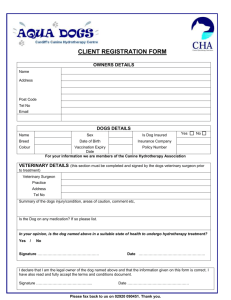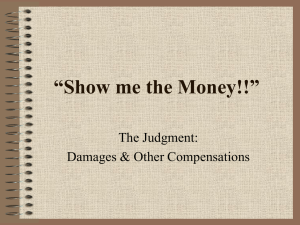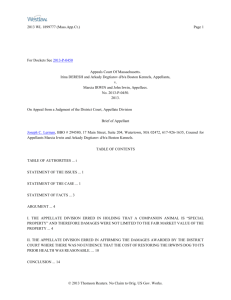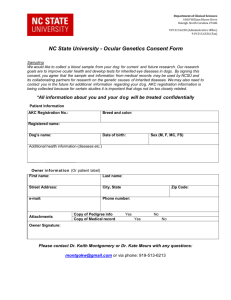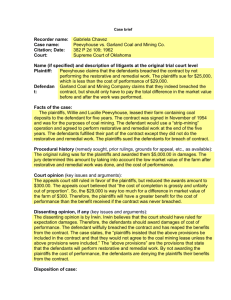Deresh v. Irwin, Brief for Appellees
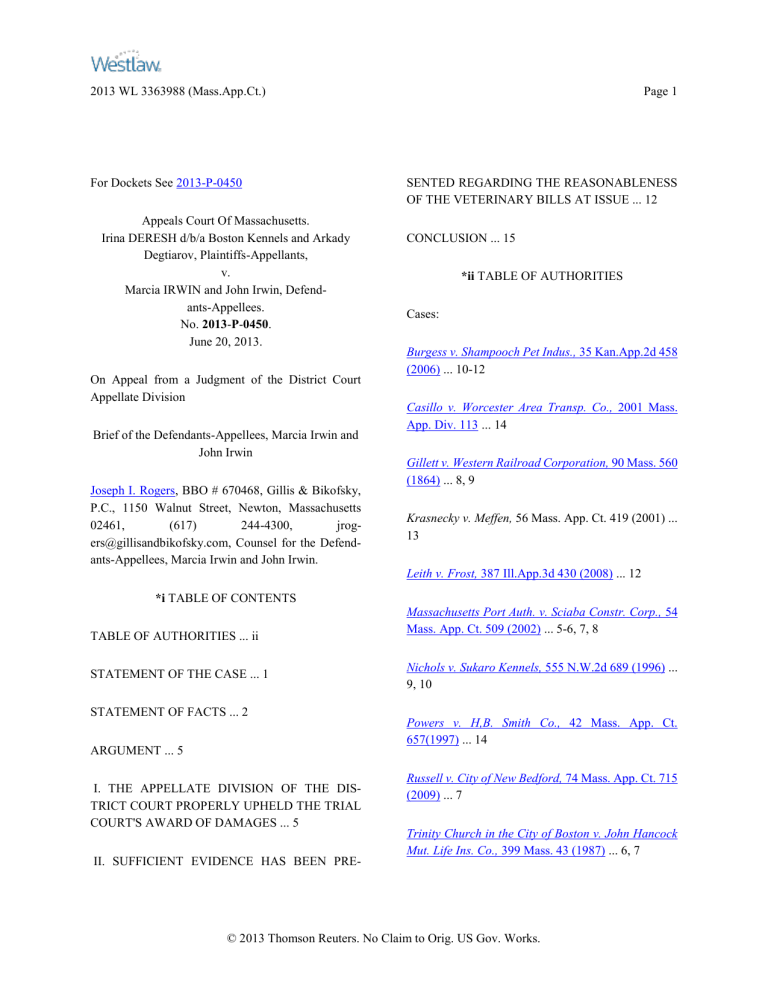
2013 WL 3363988 (Mass.App.Ct.) Page 1
For Dockets See 2013-P-0450
Appeals Court Of Massachusetts.
Irina DERESH d/b/a Boston Kennels and Arkady
Degtiarov, Plaintiffs-Appellants, v.
Marcia IRWIN and John Irwin, Defendants-Appellees.
No. 2013 P 0450 .
June 20, 2013.
On Appeal from a Judgment of the District Court
Appellate Division
Brief of the Defendants-Appellees, Marcia Irwin and
John Irwin
Joseph I. Rogers , BBO # 670468, Gillis & Bikofsky,
P.C., 1150 Walnut Street, Newton, Massachusetts
02461, (617) 244-4300, jrogers@gillisandbikofsky.com, Counsel for the Defendants-Appellees, Marcia Irwin and John Irwin.
*i TABLE OF CONTENTS
TABLE OF AUTHORITIES ... ii
STATEMENT OF THE CASE ... 1
STATEMENT OF FACTS ... 2
ARGUMENT ... 5
I. THE APPELLATE DIVISION OF THE DIS-
TRICT COURT PROPERLY UPHELD THE TRIAL
COURT'S AWARD OF DAMAGES ... 5
II. SUFFICIENT EVIDENCE HAS BEEN PRE-
SENTED REGARDING THE REASONABLENESS
OF THE VETERINARY BILLS AT ISSUE ... 12
CONCLUSION ... 15
*ii TABLE OF AUTHORITIES
Cases:
Burgess v. Shampooch Pet Indus., 35 Kan.App.2d 458
(2006) ... 10-12
Casillo v. Worcester Area Transp. Co., 2001 Mass.
App. Div. 113 ... 14
Gillett v. Western Railroad Corporation, 90 Mass. 560
(1864) ... 8, 9
Krasnecky v. Meffen, 56 Mass. App. Ct. 419 (2001) ...
13
Leith v. Frost, 387 Ill.App.3d 430 (2008) ... 12
Massachusetts Port Auth. v. Sciaba Constr. Corp., 54
Mass. App. Ct. 509 (2002) ... 5-6, 7, 8
Nichols v. Sukaro Kennels, 555 N.W.2d 689 (1996) ...
9, 10
Powers v. H,B. Smith Co., 42 Mass. App. Ct.
657(1997) ... 14
Russell v. City of New Bedford, 74 Mass. App. Ct. 715
(2009) ... 7
Trinity Church in the City of Boston v. John Hancock
Mut. Life Ins. Co., 399 Mass. 43 (1987) ... 6, 7
© 2013 Thomson Reuters. No Claim to Orig. US Gov. Works.
2013 WL 3363988 (Mass.App.Ct.) Page 2
Statutes:
G.L. c. 140, § 155 ... 1
*1 STATEMENT OF THE CASE
Following a June 8, 2011 bench trial in the Newton
District Court, the defendants (appellants) were found liable under
G.L. c. 140, § 155
for damages caused to the plaintiffs (appellees) when, on February 17, 2007, the defendants' unleashed German Sheppard attacked the plaintiffs' Bichon Frise. The Trial Court awarded the plaintiffs' eight thousand six hundred eight dollars and five cents ($8,608.05) - the amount of the dog's veterinary bills related to the February 17, 2007 attack
- in damages.
The defendants filed an Expedited Appeal. In its June
29, 2012, Decision and Order, the Appellate Division of the District Court affirmed the Trial Court's Judgment. A74. Judgment entered for the plaintiffs on July
30, 2012, and the defendants now raise the following two issues on appeal:
1. Are veterinary bills for injuries suffered by a companion animal, beyond the fair market value of that companion animal, properly included in a damages award where liability for those injuries has been established against a party?
2. If the answer to Number 1 is in the affirmative, is the party seeking such damages required to show that veterinary bills incurred in the *2 treatment of said injuries were reasonable?
STATEMENT OF FACTS
On June 8, 2011, a bench trial was held in the underlying matter before The Honorable Dyanne J. Klein,
First Justice of the Newton District Court. A20. At that time the parties stipulated to the following facts:
At the time of the alleged incident on February 17,
2007:
1. The defendants owned the two German Sheppards present at the scene of the alleged injury.
2. One German Sheppard was unleashed.
3. One German Sheppard was leashed.
Id.
After hearing all of the evidence presented, the
Trial Court made the following “Judicial Findings of
Fact:”
On February 17, 2007, in the early afternoon, plaintiff
John Irwin walked outside his front door with his
Bichon Frise, Peppermint. While in Irwin's front yard,
Peppermint was attacked by an unleashed German
Sheppard owned by the defendants; a man who had another German Sheppard on a leash accompanied the attacking dog. The German Sheppard held onto Peppermint by the neck, shaking him back and forth, while Peppermint ‘screamed’ in distress. Plaintiff
John Irwin, who had been disabled by a stroke in 2003 and walked *3 with a cane, was knocked down in the ensuing fracas, and was unable to get up until a neighbor assisted him. The man accompanying the
German Sheppards was finally able to separate the dogs. He leashed the attacking dog and walked away with both dogs a neighbor followed him. Upon being freed, Peppermint ran into the house and hid under a bed in a guest bedroom. The police were called.
Upon plaintiff Marcia Irwin's return home at approximately 4:00 p.m., she took Peppermint to Veterinary Emergency & Specialty Center of New England in Waltham, MA. Peppermint was in critical condition, with severe internal injuries, external bruising and multiple dog bites over his head, neck, abdomen, and chest. Emergency surgery was performed, wounds were drained and sutured, and a liver
© 2013 Thomson Reuters. No Claim to Orig. US Gov. Works.
2013 WL 3363988 (Mass.App.Ct.) Page 3 lobe was removed. Peppermint remained at the Veterinary Center for four days, and returned twice for follow-up care. The plaintiffs incurred damages of
$8608.05 for Peppermint's treatment at the Veterinary
Center.
At the time of the attack on Peppermint (on plaintiffs' property), Plaintiff John Irwin was not committing a trespass or other tort, and was not teasing, tormenting or abusing the German Sheppard.
A21-A22.
Dr. Amy Shroff, a veterinarian and the owner of the
Veterinarian Emergency and Specialty Center of New
England where Peppermint was treated, testified at the trial. Transcript at pp. 35-36. Dr. Shroff testified that, having reviewed all of the relevant medical records, she believed that the treatment rendered to Peppermint was “[a]bsolutely” medically necessary to *4 save the dog's life. Id.
at p. 40. More specifically, Peppermint
“needed emergency surgery to go in and try and stop the bleeding to save his life.” Id.
at Id. 39.
Dr. Shroff also testified that her veterinary hospital's billing is “based on the American Animal Hospital
Association pricing guidelines,” id. at p. 42, and that
“[t]he care was absolutely needed for Peppermint, and
I believe that the care was given appropriately, conservatively, and that the prices were fair and reasonable.” Transcript at p. 45 (emphasis added).
Counsel for the defendants asked no questions about the reasonableness of the veterinary hospital's billing practices on cross-examination. Id.
at pp. 53-57. Nor did counsel for the defendants raise the reasonableness of the veterinary bills as an issue in his closing argument. Id.
at pp. 96-99. Based on the facts set forth above, the Trial Court found that “[i]n the instant case, defendants are strictly liable for damages to the plaintiffs' property, Peppermint, i.e. the reasonable and necessary medical expenses incurred,” and awarded the plaintiffs $8,608.05 in damages.
A22-A23.
5ARGUMENT
I. THE APPELLATE DIVISION OF THE DIS-
TRICT COURT PROPERLY UPHELD THE
TRIAL COURT'S AWARD OF DAMAGES
The Appellate Division of the District Court properly upheld the Trial Court's award of damages in the underlying matter. The Court's finding that the damages awarded by the Trial Court were consistent with the objective of awarding damages which are a “fair and reasonable measure of the owner's loss” is wholly consistent with both Massachusetts case law and the law of many other jurisdictions.
The Appellate Division of the District Court correctly noted that the defendants' argument that the plaintiffs' damages should be limited to the fair market value of their dog, “presupposes that the fair market value of the damaged property is readily ascertainable and that the diminution of fair market value would be a fair and reasonable measure of the loss suffered by the owner.”
A72. Instead, “[w]here diminution in market value is unavailable or unsatisfactory as a measure of damages, courts have routinely turned to replacement or restoration costs as the appropriate measure of damages. *6 Massachusetts Port Auth. v. Sciaba Constr.
Corp., 54 Mass. App. Ct. 509, 516 (2002) . As the
Appellate Division of the District Court explained,
“[t]his reasoning has been adopted most often in the case of ‘special purpose property’ such as real property owned by nonprofit, charitable, or religious organizations, or with certain items of personal property such as heirlooms, paintings, or jewelry, where there is no ascertainable market value.” A72-A73 citing
Trinity Church in the City of Boston v. John Hancock
Mut. Life Ins. Co., 399 Mass. 43, 44-49 (1987) . The
Court concluded that this was an appropriate damages analysis in this case because:
Determining damages in the care of injury to a dog
© 2013 Thomson Reuters. No Claim to Orig. US Gov. Works.
2013 WL 3363988 (Mass.App.Ct.) Page 4 involves different considerations than with other types of personal property. A dog should not be placed in the same category as an automobile or appliance, whose market value and replacement cost can be determined with a high degree of accuracy. Limiting damages to the market value of a dog or measuring damages by the diminution in market value would not be a fair and reasonable measure of the owner's loss.
A73.
The Appellate Division of the District Court's analysis was correct whether a pet dog is classified as “special purpose property” or “real property.” While the plaintiffs acknowledge that the “fair market value” test is the test normally applied to real *7 property, the
Court in Massachusetts Port Auth.
recognized that:
Because real property is often unique, no fixed formula for measuring damages had been derived from this principle... The body of law that has developed in this area reflects that upholding the principle of fair and reasonable compensation requires flexibility in measuring the appropriate damages so as to account for the unusual or specialized character of real property and any special value it may hold for the particular owner. For this reason, in awarding damages the finder of fact should take into consideration all relevant evidence bearing on the nature of the property, the extent of the injury or loss, and the amount of money that will fairly compensate its owner for its injury or loss... The trial judge has broad discretion to determine whether evidence other than fair market value is relevant to the question of damages.
Massachusetts Port Auth., 54 Mass. App. Ct. at 514
(citations omitted) (emphasis added). In other words,
Market value does not in all cases afford a correct measure of indemnity, and is not therefore ‘a universal test.”’ Russell v. City of New Bedford, 74 Mass.
App. Ct. 715, 723 (2009) (quoting Trinity Church, 339
Mass. at 48 and Massachusetts Port Auth., 54 Mass.
App. Ct. at 514 ) (emphasis added). Where the property at issue is a pet dog which has been critically injured, “market value” is not an appropriate measure of damages. As a policy matter, a *8 “market value” analysis in injured pet cases would discourage pet owners from attempting to save injured animals if the cost of saving the animal might exceed the amount paid for the animal. Again, “[t]he trial judge has broad discretion to determine whether evidence other than fair market value is relevant to the question of damages.” Massachusetts Port Auth., 54 Mass. App. Ct. at
514 . Here, where the injured dog was in critical condition, with severe internal injuries, external bruising and multiple dog bites over his head, neck, abdomen, and chest,” the Trial Court appropriately took into consideration the costs expended by the plaintiffs in restoring the property (their dog, Peppermint) to his pre-attack, living, condition. As the Trial Court awarded the plaintiffs' damages which were in accord with the evidence presented at trial, as well as the governing statute, the defendants' appeal must be denied.
The Supreme Judicial Court's 1864 decision in Gillett v. Western Railroad Corporation, 90 Mass. 560
(1864) is by no means inconsistent with the reasoning of the Appellate Division of the District Court. The
Court in Gillett found that, where the defendant was responsible for causing injuries to the plaintiffs' *9 horses, “[t]he plaintiffs were entitled to recover their reasonable expenses incurred in curing the horses.”
Gillett, 90 Mass. at 563 . Similarly, the Appellate Division of the District Court has held that where the defendants' dog attacks the plaintiffs' dog, the plaintiff is entitled to “recover their reasonable expenses incurred in curing the [dog].” The Appellate Division of the District Court's decision is perfectly consistent with the Court's decision in Gillett.
While the defendant would have the Court believe that the Appellate Division of the District Court's decision stands in contradiction to the decisions of the other forty-nine (49) states in addressing similar matters, the
Appellate Division of the District Court's decision is, in fact, wholly consistent with those of many other
© 2013 Thomson Reuters. No Claim to Orig. US Gov. Works.
2013 WL 3363988 (Mass.App.Ct.) Page 5 states. As an initial matter, it must be noted that while the Court in Nichols v. Sukaro Kennels, 555 N.W.2d
689 (1996) , a case upon which the defendants rely, did indeed find that “whether an animal is injured or destroyed, the total damages ordinarily recoverable may not exceed its value prior thereto,” Nichols v. Sukaro
Kennels, 555 N.W.2d 689, 692 (1996) , the Court also explained that “[t]here may be other elements of damage” such as *10 “relatively long life of breed, its training, usefulness and desirable traits” and “expense of treatment or temporary loss of use or of produce.
Nichols, 555 N.W.2d at 691-92 , before awarding the plaintiff damages in the amount of $326.24 in veterinary expenses for treatment of their injured pet dog.
Id.
In Burgess v. Shampooch Pet Indus., 35 Kan.App.2d
458 (2006) , the Kansas Court of Appeals reached a holding very similar to the Appellate Division of the
District Court's based on much of the same logic. In
Burgess, the plaintiff's pet dog suffered a dislocated hip while in the care of the defendant and the Court awarded the plaintiff damages in the amount of veterinary bills totaling $1,308.89. In doing so, the Court explained that:
The Restatement and most jurisdictions take a position that in such cases it would be unjust to limit damages to the fair market value and, instead, use the so-called
‘value to the owner... as the measure of damages. See
Restatement (Second) of Torts § 911 , Comment e, at
474 (1965). The Restatement notes that where the subject matter cannot be replaced, the measure of the
‘value to the owner’ is left largely to the discretion of the trier of fact. Several jurisdictions have found that where recovery is sought for a dog's injury, however, the owner is entitled to recover the reasonable veterinary expenses incurred in treating *11 those injuries.
See Kaiser v. United States, 761 F. Supp. 150 (D.D.C.
1991) [462] ($1786.50 in veterinary fees awarded pursuant to the Federal Tort Claims Act for injury to dog shot by United States Capitol Police officer);
Kurash v. Layton, 251 N.J. Super. 412, 598 A.2d 535
(1991) ( $851 in veterinary fees awarded to owner whose dog sustained injuries when it was impregnated by defendant's trespassing dog).
Burgess, 35 Kan.App.2d at 461-462 (citations omitted) (emphasis added). The Court in Burgess went on to hold that:
[W]hen an injured pet dog with no discernible market value is restored to its previous health, the measure of damages may include, but is not limited to, the reasonable and customary cost of necessary veterinary care and treatment.
Id.
at 463 (emphasis added).
The Burgess Court further explained that:
Market value means, generally, the price for which an article is bought and sold, and is ordinarily best established by sales in the ordinary course of business.
In order for it to be said that a thing has a market value, it is necessary that there shall be a market for such commodity. In the instant case, unlike other types of personal property, there are no true marketplaces that routinely deal in the buying and selling of previously owned pet dogs. Moreover, Murphy's real value to
Burgess as a household pet is noneconomic and, as a result, is difficult if not impossible to appraise in the purely economic terms of market value... Moreover, the award of the amount Burgess spent on veterinary bills is in accord with the very purpose of the law of damages-to make Burgess whole and return *12 her to the position she was in prior to Shampooch's tortious conduct.
Id.
at 463-465.
In Leith v. Frost, 387 I11.App.3d 430 (2008), a case in which, as here, the defendant's large dog (a husky) attacked the plaintiffs' small dog (a dachshund) in the plaintiffs' yard, the Illinois Appellate Court awarded the plaintiff $4,784.00 for the dog's veterinary care, after it:
[S]pecifically adopt[ed] the rationale of Burgess v.
© 2013 Thomson Reuters. No Claim to Orig. US Gov. Works.
2013 WL 3363988 (Mass.App.Ct.) Page 6
Shampooch Pet Industries, Inc., 35 Kan. App. 2d 458,
463, 131 P.3d 1248, 1252 (2006) , in which the Court of Appeals of Kansas held: “When an injured pet dog with no discernible market value is restored to its previous health, the measure of damages may include, but is not limited to, the reasonable and customary cost of necessary veterinary care and treatment.”
Leith v. Frost, 387 I11.App.3d 430, 436-437 (2008)
(quoting Burgess, 35 Kan. App. 2d at 463 ).
II. SUFFICIENT EVIDENCE HAS BEEN PRE-
SENTED REGARDING THE REASONABLE-
NESS OF THE VETERINARY BILLS AT ISSUE
Sufficient evidence was presented at the underlying trial in this matter for the Trial Court, and then the
Appellate Division of the District Court, to have found the veterinary bills incurred in restoring Peppermint to his pre-attack health to be *13 fair and reasonable. In
Krasnecky v. Meffen, 56 Mass. App. Ct. 419 (2001), upon which the defendant relies, the plaintiffs introduced no evidence of economic loss and sought damages for emotional distress and loss of companionship and society. Krasnecky, 56 Mass. App. Ct. at
421 . Here, on the other hand, it is undisputed that the veterinary bills at issue were offered into evidence.
Furthermore, Dr. Shroff, a veterinarian and the owner of the Veterinarian Emergency and Specialty Center of New England where Peppermint was treated, testified that her veterinary hospital's billing is “based on the American Animal Hospital Association pricing guidelines,” id. at p. 42, and that “[t]he care was absolutely needed for Peppermint, and I believe that the care was given appropriately, conservatively, and that the prices were fair and reasonable.
” Transcript at p.
45 (emphasis added). Counsel for the defendants asked no questions about the reasonableness of the veterinary hospital's billing practices on cross-examination. Id.
at pp. 53-57. Nor did counsel for the defendants raise the reasonableness of the veterinary bills as an issue in his closing argument. Id.
at pp. 96-99. “In awarding damages, the trial court has broad discretion. Only *14 in rare instances can it be ruled that there has been an abuse of discretion amounting to an error of law.”' Casillo v. Worcester
Area Transp. Co., 2001 Mass. App. Div. 113, 116 , citing Powers v. H.B. Smith Co., 42 Mass. App. Ct.
657, 665 (1997) . Based on Dr. Shroff's testimony, the
Trial Court and the Appellate Division of the District
Court were well within their discretion in finding that the veterinary bills incurred by the plaintiffs were reasonable.
It must further be noted that a careful reading of the defendants' brief demonstrates that the defendants have not at all addressed the issue raised on appeal - whether the “veterinary bills incurred in the treatment of said injuries were reasonable” - and instead raise a new “reasonableness” argument which has no merit.
The defendants' new argument was also not properly preserved either at trial or on appeal. The plaintiffs respectfully submit that said argument, having not been properly preserved, should not be considered by the Court.
15CONCLUSION
In conclusion, the defendants' appeal must be denied, because the Appellate Division of the District Court's finding that the damages awarded by the Trial Court were consistent with the objective of awarding damages which are a “fair and reasonable measure of the owner's loss” is wholly consistent with both Massachusetts case law and the law of many other jurisdictions, and sufficient evidence of the reasonableness of said damages was presented at trial.
WHEREFORE, for the foregoing reasons, the plaintiffs respectfully request that this Honorable Court deny the defendants' appeal and uphold the Decision and Order of the Appellate Division of the District
Court affirming the Trial Court's Judgment.
Irina DERESH d/b/a Boston Kennels and Arkady
© 2013 Thomson Reuters. No Claim to Orig. US Gov. Works.
2013 WL 3363988 (Mass.App.Ct.)
Degtiarov, Plaintiffs-Appellants, v. Marcia IRWIN and John Irwin, Defendants-Appellees.
2013 WL 3363988 (Mass.App.Ct. ) (Appellate Brief )
END OF DOCUMENT
Page 7
© 2013 Thomson Reuters. No Claim to Orig. US Gov. Works.
